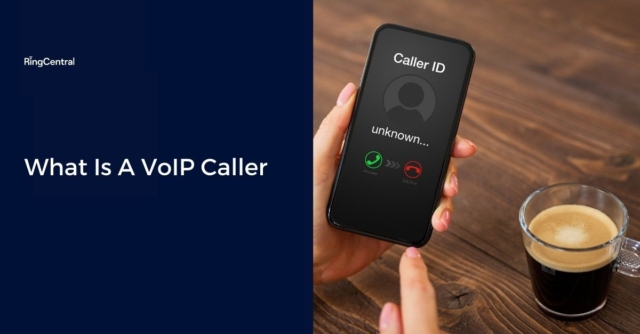What Is A VoIP Caller: Everything You Need to Know
If you’ve noticed that you’re receiving a few unsolicited phone calls and all you see on your smartphone’s mobile caller ID display are the words ‘VoIP caller’, you’re not alone.
As VoIP (voice over internet protocol) technology becomes increasingly popular, a rising number of businesses have adopted IP telephony as their chosen telecommunications channel. That means you’ll be receiving more calls via the internet. For the most part, receiving calls from a VoIP caller should be fairly harmless, but in this post, we’ll give you a rundown of what VoIP means
What is VoIP
So what is VoIP?
In essence, voice over internet protocol is the technology that allows us to transmit voice calls over an IP network.
If you’ve ever made or received calls via WhatsApp, Skype, or Facebook messenger, then you’ve used VoIP. VoIP is fast becoming the preferred method of telecommunications for organisations the world over, so we’re set to see a lot more of it as business leaders look for flexible, reliable channels for connecting their increasingly remote workforce.
How does VoIP work?
In the simplest terms, it just means making and receiving phone calls via an internet connection instead of more traditional phone lines.
Rather than transmitting calls via PSTN (public switched telephone network) using phone companies, a specific carrier or provider, along with cell towers and old copper cabling, VoIP calls can be routed through a broadband connection instead. VoIP uses digital signals instead of analog, meaning your VoIP system can be a lot more agile than a regular phone.
Benefits of VoIP Service
Using a virtual phone system comes with several advantages for businesses such as the below:
Mobility: VoIP users can make calls from anywhere. Generally speaking, the technology is cloud-based, allowing callers to access the phone system via a softphone app, or desktop wherever they are in the world.
Convenience and cost savings: Running a traditional phone system can be costly, clunky, and difficult to manage if you want to make changes. When you switch to a VoIP phone, your communications system will save you money as subscribers won’t have a big outlay on hardware, and generally, costs are broken down into manageable monthly fees.
Scalability: Where with traditional PBX phone systems businesses would have to physically install extra phone lines, a VoIP system allows much better flexibility and control over adding or reducing the number of users. Administrators can usually do this themselves simply by logging in and making changes within the software interface, meaning you’re much better prepared for growth.
Security: With a reliable VoIP service provider, you should also have better control over your communications data. As your calls and exchanges happen over the internet, you’ll be able to ensure you’re using a reliable IP telephony platform, such as RingCentral that uses end-to-end encryption to safeguard your business conversations.
The VoIP & Caller ID Protocols
VoIP caller ID (voice over internet protocol caller identification) pretty much does what it says on the tin. It is simply an application that enables you to identify a VoIP caller on a VoIP phone in the same way as the name of the caller might display on a traditional landline phone system.
With VoIP though, users can benefit from more advanced features such as blocking specific phone numbers or organisations in the same way that one might blacklist an email address to stop receiving unwanted spam.
What is a VoIP call?
We’ve outlined how a VoIP phone system works. So, put simply, a VoIP call is a phone call that you receive from a person or entity using a VoIP phone system to transmit information digitally.
If you’ve ever used WhatsApp to call someone, whether it be to save data or because you have a limited phone signal, that’s a VoIP call; a call that connects via the internet.
How do I stop VoIP calls?
If you continue to receive calls from the same unsolicited calls from the same number or VoIP caller, it’s relatively easy to prevent this from happening.
With a VoIP phone, it’s really easy to simply block the number using your in-built call-blocking tool. Alternatively, to avoid telemarketers or salespeople from gathering your data, you can register your number on the TSP (Telephone Preference Service), which is essentially the UK’s official ‘Do Not Call’ registry.
How do you identify a VoIP number?
Being able to identify a VoIP caller is useful, but it can be tricky. In fact, because IP technology and VoIP numbers have become so easily accessible, they are increasingly used by scammers or fraudulent entities looking to replicate a legitimate business phone number. The main issue with identifying a VoIP number is that it is easy for scammers to fake the caller ID.
This spoofing has meant, even when using caller ID, consumers need to be extremely vigilant when receiving calls from any VoIP number.
Another way to identify a VoIP caller though is via the CNAM or official caller name. While this is more difficult to access, it is a component of your caller ID information, and depending on the platform, call recipients should be able to access an API function that allows them to conduct a ‘CNAM lookup’ to identify the organisation or entity behind the caller.
How to block VoIP Calls from the Router
If you want to block a specific VoIP number, another option is to block calls via your router. This option is a little more technical but can be very effective if you want to stop receiving particular calls.
First, you’ll need to establish which VoIP application the caller is using along with the TCP/UDP ports that each application uses. This port information should be accessible in the product documentation. Once you’ve established the information you can log into your router’s control panel, which should allow you to block the ports in question. After this, you may want to reset your router by turning the power on and off to make sure you complete the blocking process.
The benefits of having a VoIP caller ID
Having a built-in caller ID with your VoIP solution can help your brand present a more professional image when talking to customers, and it can help you to prevent wasting time with unsolicited calls.
Having caller ID means your agents will be more productive by instantly being able to prepare for incoming calls.
Likewise, with outbound calls, you’ll be able to improve your brand recognition by having your company name displayed when you make calls to customers and other external stakeholders.
Best VoIP Call Recording Software
VoIP call recording tools can be another great benefit when it comes to implementing a VoIP phone system. Whether you want to keep a log of unwanted incoming VoIP calls, listen back to calls for training purposes, keep a record of your meetings or asses calls for compliance purposes, there are some great call recording solutions on the market.
Here are just a few of the best options if you’re looking for a telecom provider with call recording software to help you improve your workplace communications efficiency.
- Vonage
- 8×8
- Nextiva
- Phone.com
- Ooma
- Grasshopper
- RingCentral
Our RingCentral all-in-one communications solution is an industry leader in the business communications space.
With video conferencing, instant messaging, task management and a comprehensive VoIP phone system with call and meeting recording capabilities, RingCentral also keeps your communications safe with dynamic end-to-end encryption.
Whether you’re a contact centre organisation, large enterprise business, or a small business startup, RingCentral offers solutions and pricing tailored to every need and budget.
Frequently Asked Questions:
-
How to minimize SIP/VoIP Fraud Attacks
Sadly, because of its accessibility, VoIP technology is being exploited. With fraudulent campaigns becoming increasingly sophisticated and complex, it can be tricky to eradicate fraudulent attacks and vishing campaigns. One essential step for minimising VoIP fraud though is to work together with your VoIP provider to optimise the security of your network and detect some of the common signs of cybercrime.
-
Does “VoIP caller” mean it’s a scam?
Seeing the words ‘VoIP caller’ on the display screen may not necessarily mean you’re falling foul of a scam. Remember, business VoIP and IP phone solutions are very commonly used by a number of different businesses, so chances are, you could be receiving calls from a legitimate source.
In most cases, you should be able to identify a VoIP phone number by trying a reverse phone lookup. Or alternatively, search the IP address, domain and provider if you need to dig a little deeper to find the source of unwanted calls.
-
Can a VoIP call be traced?
Whether or not you can trace a VoIP call depends on whether it’s a fixed or non-fixed number. A VoIP number that’s fixed simply means it is tethered to a physical location, usually an office space. A fixed line is therefore often fairly easy to trace. If the call comes from a non-fixed VoIP number, it won’t be tied to any particular address, meaning it will be much less easy to trace.
-
Can you call back a VoIP number?
In essence, yes. You should be able to simply call back any VoIP number regardless of whether you’re dealing with a fixed or non-fixed line.
-
What are the uses of VoIP Technology?
A VoIP phone service can be chosen for a number of different use cases. Mostly, businesses will implement a VoIP number so that they can make and receive calls via a secure WiFi connection, which enables them to place and receive calls in real-time over the internet. More specific uses of the technology include the following:
- Auto-attendant capabilities
- Tailored call forwarding and call routing
- The ability to choose an area code or a local number
- Virtual voicemail functionality
Originally published May 18, 2022

